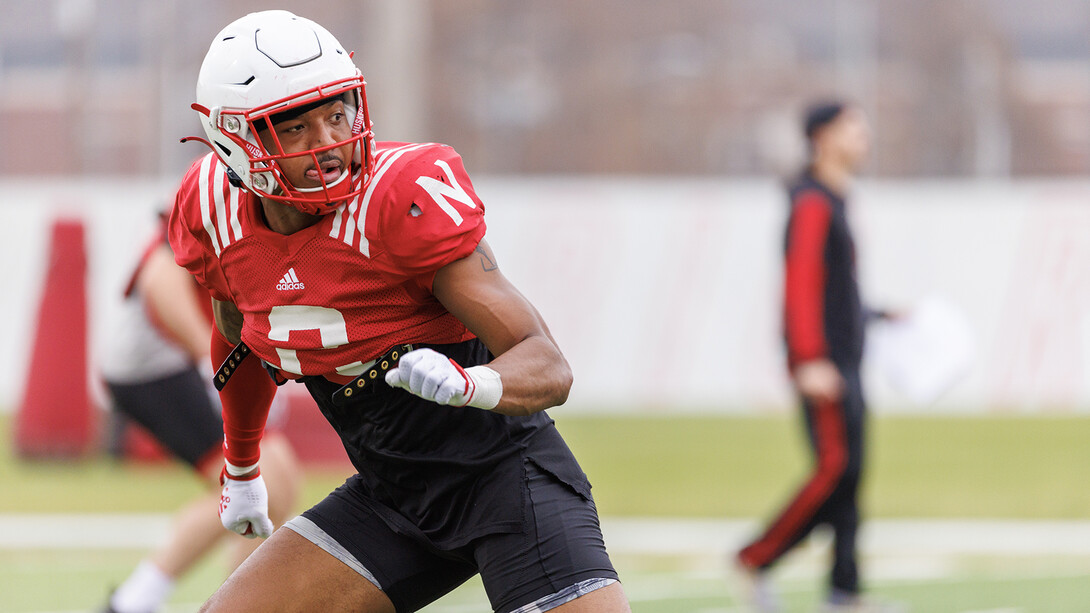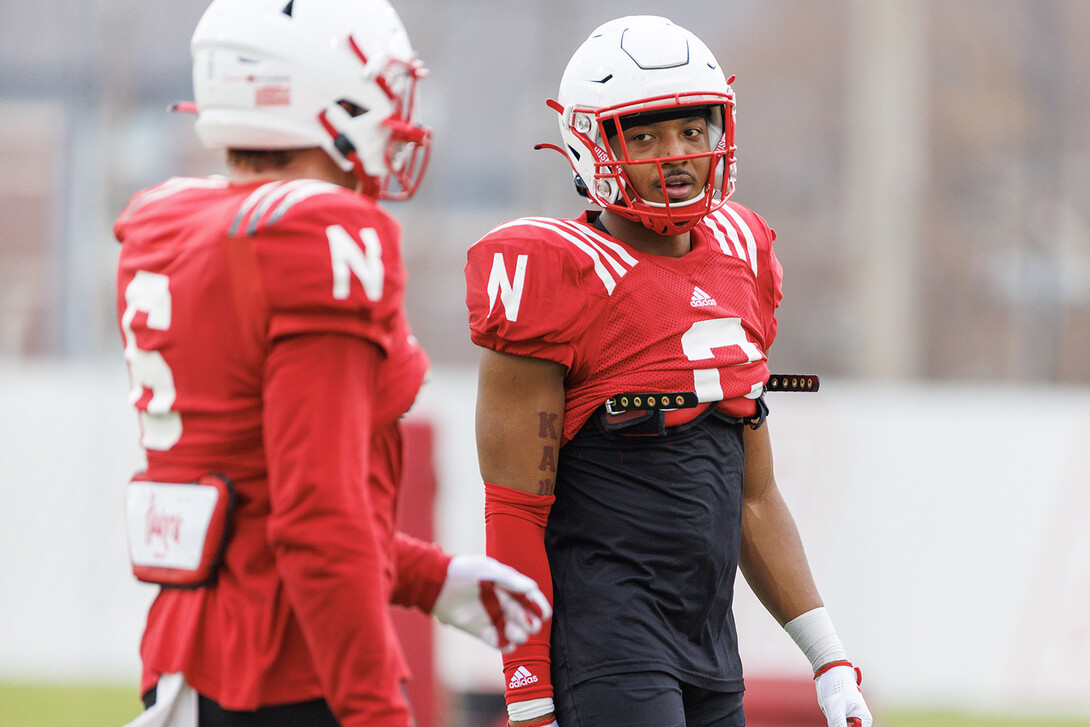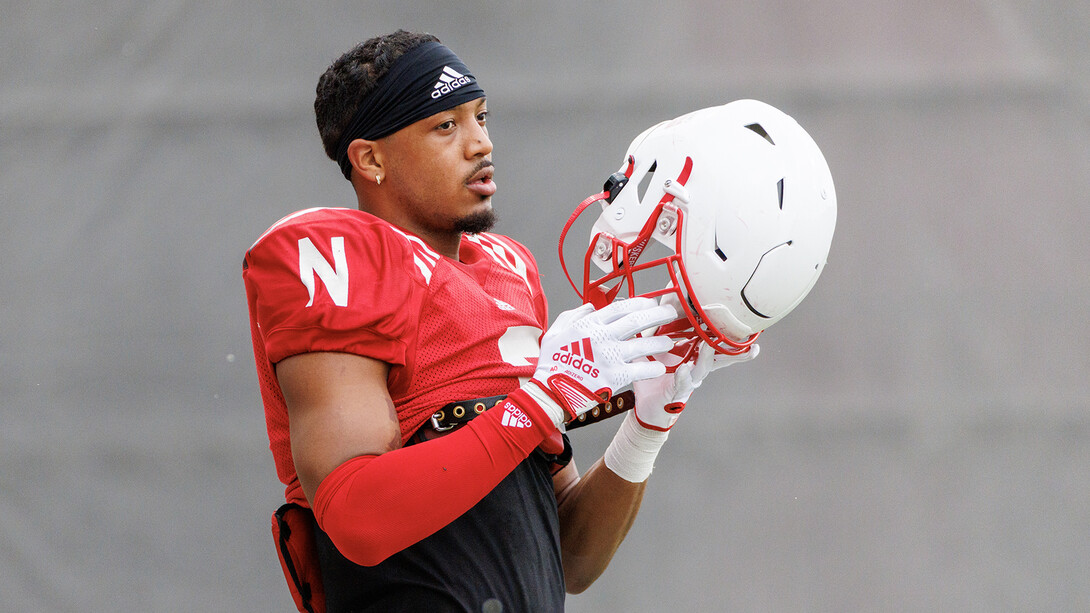
Meet Darius Moore, who is part of the Omaha Tribe of Nebraska. He is also a walk-on with the Husker football squad and a senior ethnic studies major. Originally from Tiffen, Iowa, Moore looks forward to earning a Big Ten degree and becoming a coach before working on diversity, equity and inclusion issues with youth.
This is part of a conversation series highlighted as part of Native American Heritage Month on the University of Nebraska–Lincoln’s Medium page. The series features Huskers who are making impacts on campus and beyond.
Talk a little about your experience being a walk-on. What drew you to Nebraska U?
When I attended Iowa Western Community College, there were a select few schools that were on my radar. Once Nebraska hit me up, and asked me to visit, I had no idea what I was going to be in for.
Game day at Nebraska is different from any other school. From the loyal fans, the bright red fireworks, to the famous tunnel walk that sends chills down my spine every single Saturday.
It was in the summer when my coach at Iowa Western, Scott Strohmeir called my phone saying he just got done speaking with Scott Frost because they were down safeties. He sent Frost over my film and within five minutes he said, ‘send him down.’
As far as my experience as a Husker walk-on, it has been a ride. We are expected to work harder with no complaints, and compete whether going up against another walk-on or a scholarship dude. Fortunately, my parents instilled those things in me at a young age, so it is second nature. Times are tough at times mentally, sometimes not getting the respect or credit that is earned, but that’s how life is. I rarely thought of myself as a walk-on as I hold myself to the highest standard of any scholarship player, but it is definitely something that I take pride in. Plus, the training table food is second to none, Dennis in academics helped me get on track to graduate, and the friends I have made here are friends for life.
What is your tribal affiliation and why is that important to you?
Tribal affiliation to me is important for many reasons. Being a part of the Omaha (Umonhon) Tribe of Nebraska means a lot to me. The way we teach, the ceremonies we take part in and the family lineage of strong people who have been impacted by genocide, shows how tough we are.
Although the sad history of my people’s treatment was in no comparison, these ideals helped me as a walk-on as they are similar in some ways. Dancing with heavy regalia on in 100 degree summers, sweat ceremonies and knowing my family history helps me mentally every time I touch the turf. Our teachings and ceremonies are something I will have to carry on to my children so they can continue a great legacy that was set hundreds of years before them. Plus, I want to set an example for the Native community and be an inspiration to the little kids watching on Saturdays.

Is there anything you hope to accomplish in your lifetime?
Graduating with my bachelor of arts and master’s degrees are first on my list.
As far as a career goes, I am going to be a successful coach with the sport I love at the highest collegiate level. Being a defensive back takes a lot of knowledge of the game and knowledge is what Coach Fish (Travis Fisher) has taught me. I have about 10 books of notes from just him, and I am continuing to be a student of the game.
After my career in coaching, I would love to teach or do what Dr. (Lawrence) Chatters does, working in diversity, equity and inclusion at a university. With my background in ethnic studies and the help of Dr. Chatters, I am sure it would be a stepping stone to working with students.
What or who inspires you?
My inspiration comes from two things — the first being my parents. My pops was a walk-on at the University of Iowa and ended up getting school paid for. His story is the definition of dedication, hard work and battling whatever life throws at him. I have seen him grind through tough times being a father and the older I get, the more I realize and appreciate how good of a father he is. Not complaining one single time. He has taught me many lessons about being a man and I will not disappoint. I guess we have the same mindset when stuff hits the fan and that is one thing I am proud of.
Secondly, my legacy inspires me. I want to be known as that kid who shows up with a smile on his face, ready to work. I want to be remembered as a friend who is always dependable, and someone who gives back to his community. I want to build a legacy so I can be an inspiration to others and it starts now.
What drew you to Ethnic Studies and how do you hope to use those lessons after graduation?
Since elementary school, my mom, who worked at the University of Iowa in academics, has taught me about American history. For example, I remember talking to my mom about Christopher Columbus and telling her that we sang songs about him, and how he discovered America, all that good stuff. She sat me and my siblings down and we had a long conversation about the terrible ways he treated the Indigenous people he encountered. The next day, I went to school excited and ready to share all of this new information to my class. I still remember the look on my teacher’s face when I told the class about what my mom had just taught me. This was the moment where I became hooked on history.
From then on, we had conversations about great political and civil rights leaders, and I just kept soaking in the information.
As I got closer to college, I wanted to learn everything about history and apply it to my community so I can teach. So, my mom recommended Ethnic Studies. As a result, I cannot get enough, learning about different cultures and ethnic groups and how they shape the world. I want to spread this information because I believe everyone has the right to know about the world’s true colors.
What is your advice to other students looking to make an impact on campus?
Stick to what you are passionate about. Whatever that is, craft and perfect it until you can’t get it wrong. Even if others disagree, their opinions are irrelevant. The only opinion that matters is yours.








